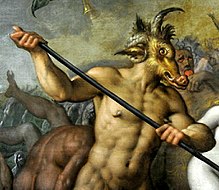In mainstream Christianity the Devil is known as Satan and sometimes as Lucifer,
although it has been noted that the reference in Isaiah 14:12 to
Lucifer, or the Son of the Morning, is a reference to the Babylonian
king.[14] Some modern Christians consider the Devil to be an angel who, along with one-third of the angelic host (the demons) rebelled against God and has consequently been condemned to the Lake of Fire.
He is described as hating all humanity, or more accurately creation,
opposing God, spreading lies and wreaking havoc on the souls of mankind.
Other Christians consider the devil in the Bible to refer figuratively
to human sin and temptation and to any human system in opposition to
God.

Horns of a goat and a ram, goat's fur and ears, nose and canines of a pig, a typical depiction of the Devil in christian art. The goat, ram and pig are consistently associated with the Devil.[15] Detail of a 16th-century painting by Jacob de Backer in the National Museum in Warsaw.
In the Bible, the devil is identified with "The dragon" and "the old serpent" in the Book of Revelation 12:9, 20:2 have also been identified with Satan, as have "the prince of this world" in the Book of John 12:31, 14:30; "the prince of the power of the air" also called Meririm, and "the spirit that now worketh in the children of disobedience" in the Book of Ephesians 2:2; and "the god of this world" in 2 Corinthians 4:4.[16] He is also identified as the dragon in the Book of Revelation (e.g.[17]), and the tempter of the Gospels (e.g.[18]).
Beelzebub is originally the name of a Philistine god (more specifically a certain type of Baal, from Ba‘al Zebûb, lit. "Lord of Flies") but is also used in the New Testament as a synonym for Satan. A corrupted version, "Belzeboub", appears in The Divine Comedy.
In other, non-mainstream, Christian beliefs (e.g. the beliefs of the Christadelphians) the word "satan" in the Bible is not regarded as referring to a supernatural, personal being but to any 'adversary' and figuratively refers to human sin and temptation.[19]

No comments:
Post a Comment